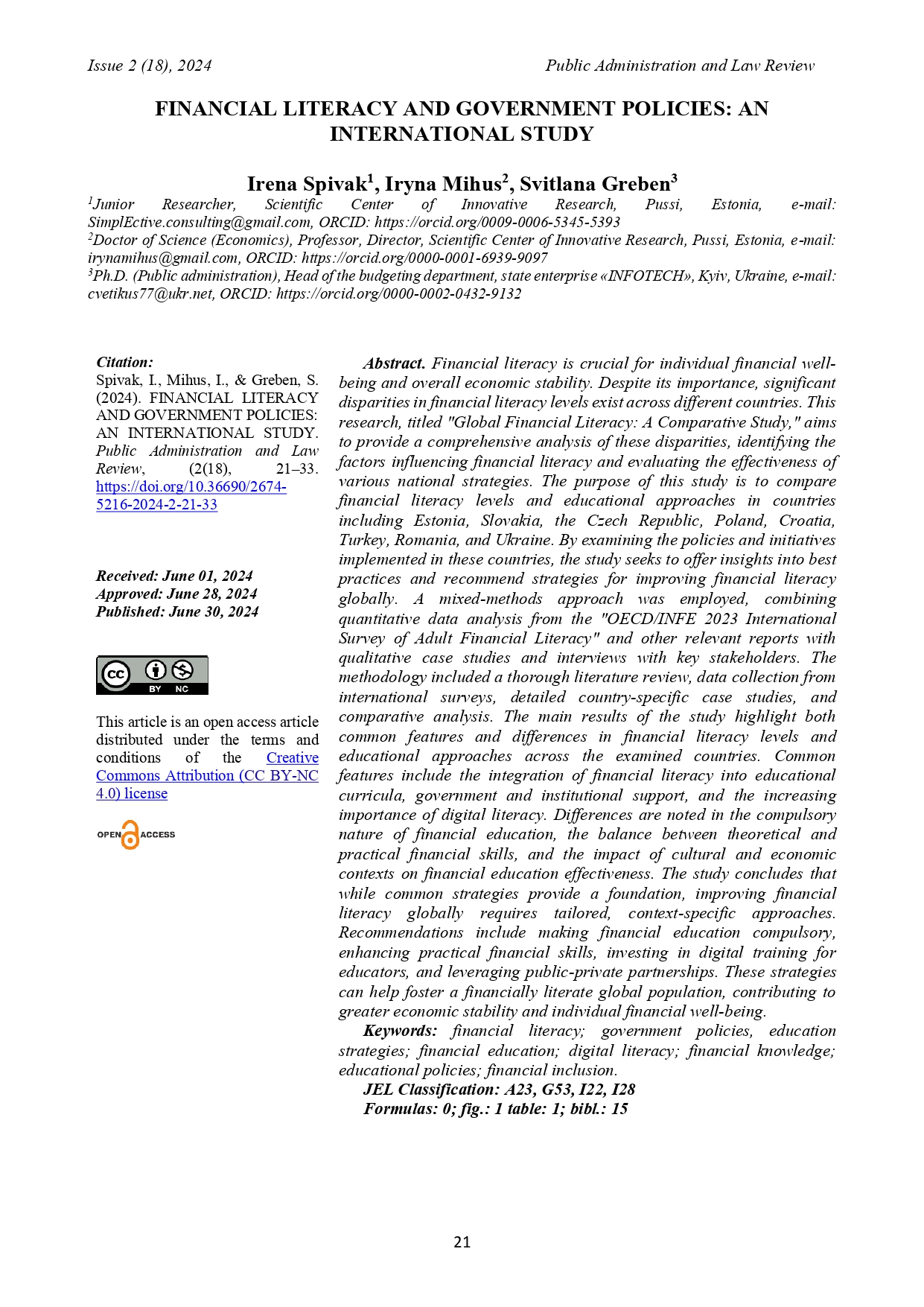FINANCIAL LITERACY AND GOVERNMENT POLICIES: AN INTERNATIONAL STUDY
DOI:
https://doi.org/10.36690/2674-5216-2024-2-21-33Keywords:
financial literacy, government policies, education strategies, financial education, digital literacy, financial knowledge, educational policies, financial inclusionAbstract
Financial literacy is crucial for individual financial well-being and overall economic stability. Despite its importance, significant disparities in financial literacy levels exist across different countries. This research, titled "Global Financial Literacy: A Comparative Study," aims to provide a comprehensive analysis of these disparities, identifying the factors influencing financial literacy and evaluating the effectiveness of various national strategies. The purpose of this study is to compare financial literacy levels and educational approaches in countries including Estonia, Slovakia, the Czech Republic, Poland, Croatia, Turkey, Romania, and Ukraine. By examining the policies and initiatives implemented in these countries, the study seeks to offer insights into best practices and recommend strategies for improving financial literacy globally. A mixed-methods approach was employed, combining quantitative data analysis from the "OECD/INFE 2023 International Survey of Adult Financial Literacy" and other relevant reports with qualitative case studies and interviews with key stakeholders. The methodology included a thorough literature review, data collection from international surveys, detailed country-specific case studies, and comparative analysis. The main results of the study highlight both common features and differences in financial literacy levels and educational approaches across the examined countries. Common features include the integration of financial literacy into educational curricula, government and institutional support, and the increasing importance of digital literacy. Differences are noted in the compulsory nature of financial education, the balance between theoretical and practical financial skills, and the impact of cultural and economic contexts on financial education effectiveness. The study concludes that while common strategies provide a foundation, improving financial literacy globally requires tailored, context-specific approaches. Recommendations include making financial education compulsory, enhancing practical financial skills, investing in digital training for educators, and leveraging public-private partnerships. These strategies can help foster a financially literate global population, contributing to greater economic stability and individual financial well-being.
Downloads
References
OECD/INFE (2023). "OECD/INFE 2023 International Survey of Adult Financial Literacy." URL: https://shorturl.at/PkyC9
Eurostat (2019). "Annual Activity Report 2019." European Commission. URL: https://shorturl.at/mOc7M
Ministry of Finance of Estonia (2021). "Strategy for Developing Financial Wisdom in Estonia 2021–2030." URL: https://shorturl.at/Q3nzN
Táncošová, J., Lincényi, M., & Fabuš, M. (2023). "Towards Financial Literacy: A Case of Slovakia." Entrepreneurship and Sustainability Issues, 10(3), 288-301. URL: https://doi.org/10.9770/jesi.2023.10.3(19).
Swiecka, B., Yeşildağ, E., Özen, E., & Grima, S. (2020). "Financial Literacy: The Case of Poland." Sustainability, 12, 700. URL: https://doi.org/10.3390/su12020700.
Tomášková, H., Mohelská, H., & Němcová, Z. (2011). "Issues of Financial Literacy Education." Procedia-Social and Behavioral Sciences, 28, 365-369. URL: https://doi.org/10.1016/j.sbspro.2011.11.069.
Melnychuk, D., Malyuga, N., Sulimenko, L., Shafranova, K., & Voinalovych, I. (2024). The Social Sphere In The Era Of Digitalization: Financial And Accounting Aspects. Economics, Finance and Management Review, (1(17), 4–15. https://doi.org/10.36690/2674-5208-2024-1-4
Mustafa Recep Bilici & Saygın Çevik (2022). "Financial Literacy and Cash Holdings in Turkey." Working Paper No: 22/02. Central Bank of Turkey. URL: https://shorturl.at/mcOf8
Tican Başaran, S., Gürdal, G., & Altıntaş, S. (2021). "Financial Literacy in Turkish Preschool Education." Psycho-Educational Research Reviews, 10(2), 8-28. URL: https://doi.org/10.52963/PERR_Biruni_V10.N2.01.
Șimandan, R., Leuștean, B., & Dobrescu, R.M. (2022). "An Uphill Battle: Financial Education in Romania in the Midst of Societal Transformation." Journal of Risk and Financial Management, 15, 494. URL: https://doi.org/10.3390/jrfm15110494.
World Economic Forum (2019). "The Global Competitiveness Report 2019." URL: https://www3.weforum.org/docs/WEF_TheGlobalCompetitivenessReport2019.pdf
OECD (2019). "Play!", Trends Shaping Education Spotlights, No. 18, OECD Publishing, Paris. URL: https://www.oecd-ilibrary.org/education/play_a4115284-en
Global Innovation Index (2020). World Intellectual Property Organization. URL: https://www.wipo.int/global_innovation_index/en
Global Competitiveness Index. (2019). URL: http://www3.weforum.org/docs/WEF_TheGlobalCompetitivenessReport 2019.pdf.
National Erasmus+ Оffice – Ukraine. URL: www.erasmusplus.org.ua.

Downloads
Published
How to Cite
Issue
Section
License

This work is licensed under a Creative Commons Attribution-NoDerivatives 4.0 International License.





